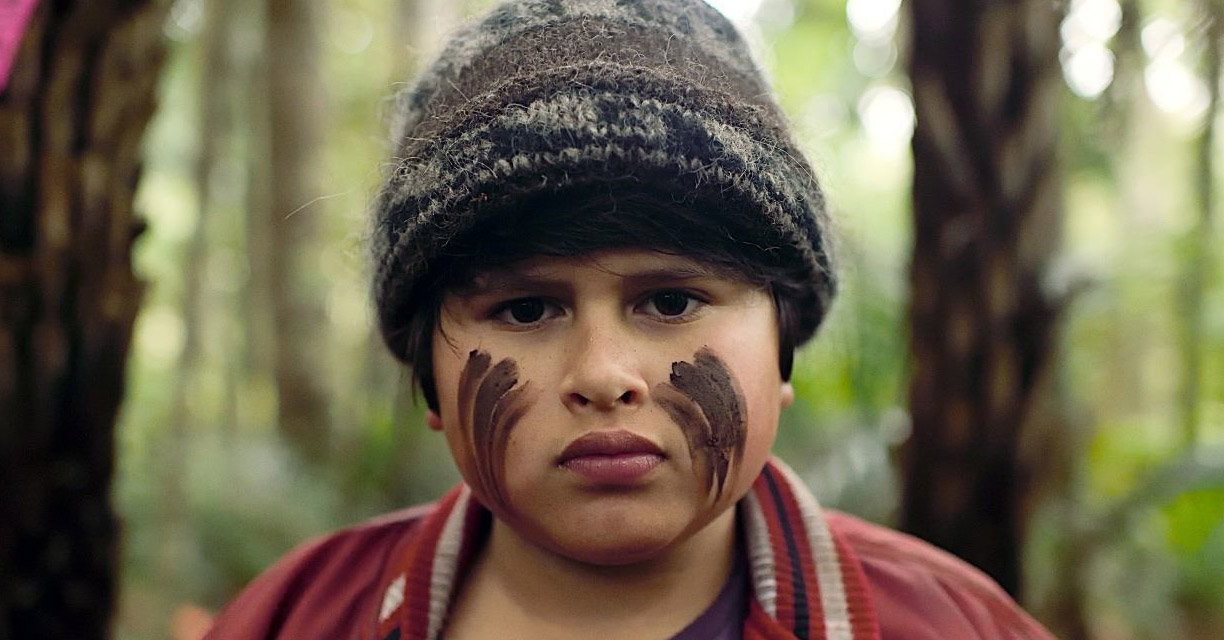Lost in the Wilderpeopleness
Hunt for the Wilderpeople / directed by Taika Waititi
It’s hard to think of another recent film that is so superficially inoculated against criticism. The hero of Hunt for the Wilderpeople, Ricky (Julian Dennison), is an adorable New Zealand orphan who just wants a real home and to be his unique self, goals that are achieved and challenged in a not-quite-surreal adventure through the New Zealand bush. But though it oozes charm and vitality, plunges us into unfamiliar, gorgeous landscapes, and plays an audacious game of mixing high drama with studied, small-scale sweetness, Wilderpeople never quite feels as authentic or heart-rending as it seems to want, or adds up to a coherent, persuasive whole.
Upfront with its tweeness, and happy to pour on the high drama in support of its pipsqueak hero, Wilderpeople opens with dazzling overhead footage of forests and a police car wending its way to an isolated farmstead, as a haunting chorus provides the soundtrack. Out of the car steps a mean-spirited child welfare officer, a lackadaisical cop, and orphaned Ricky. The welfare officer, Paula (Rachel House), has nothing good to say about Ricky, listing off his past sins and warning him to behave himself. Ricky’s new guardian, Bella (Rima Te Wiata), seems good-hearted but initially doesn’t appear quite sure how to handle this sweet-faced but reputationally dubious kid; meanwhile, her husband, Hec (Sam Neill), glowers from the barn and suggests he wants nothing to do with the newcomer.
Luckily for Ricky, it turns out that Bella has a sharp instinct for luring in the wary child; she humors his attempts to run away, lets him follow her around the farm, and teaches him to shoot. Even Hec seems to warm up to the kid, giving subtle hints that an adorable birthday song performed by Ricky and Bella is kind of heartwarming. But this initial idyll ends with Bella’s sudden death and the threat of further catastrophe, as the child services people determine that the motherless household is no longer fit for Ricky’s upbringing.
Ricky takes off into the bush, overconfident of his survival skills, and at any rate is soon overtaken by Hec, who insists Ricky accompany him back to civilization. But as they argue, Hec breaks his foot, and the two end up stranded for weeks in a bare bones but companionable sylvan encampment. Of course, this leads to all sorts of dark speculation on the part of the child welfare folks that Hec has kidnapped his semi-ward, and a few misunderstandings later, Ricky and Hec are full-blown outlaws (and folk heroes!) on the run from bounty hunters, a rappelling S.W.A.T. team, and the monomaniacal Paula (who, to communicate her focus on saving Ricky, is given to repeating the words “No child left behind” like a brain-damaged George Bush).
It’s not that there aren’t subtleties and honest emotions in Wilderpeople; the problem is that they’re so often overpowered by the film’s relentless hit and miss silliness. A case could be made that the world of the film is largely filtered through the eyes of 13-year-old Ricky, so that every event ultimately passes through a lense that downplays danger and sadness, and boosts the quotient of adventure and possibility. For all the film’s charms, it ultimately feels wearing to be inside the real-life fantasy of a 13-year-old, and the film doesn’t really give the audience room to breathe amidst its vignette structure (it’s broken into 10 distinct chapters). Our experience is mirrored by that of Hec; with his seasoned, cynical perspective, he’s given a new lease on life by this adventure, and a strong case can be made that he’s the real driving force behind the duo’s quest for freedom in the New Zealand wilds. You get the sense that Hec might have enjoyed finishing his days in the wilderness, but he’s responsible enough a guardian to realize that Ricky still needs other people and a bit more socialization to finish growing up.

